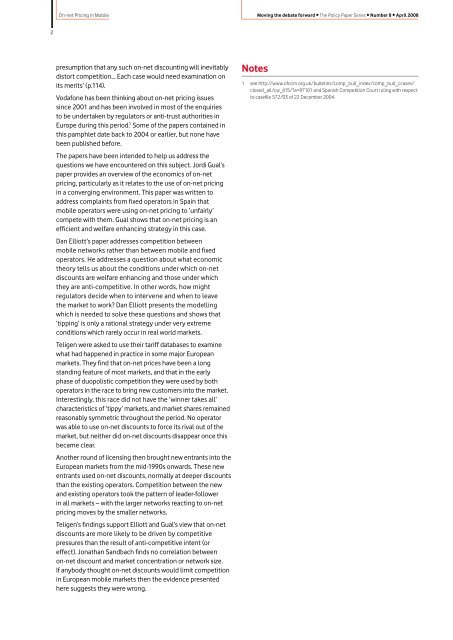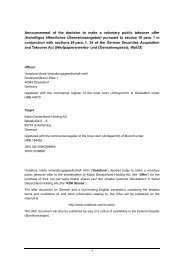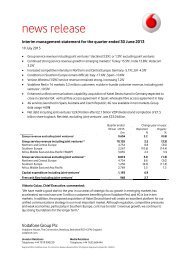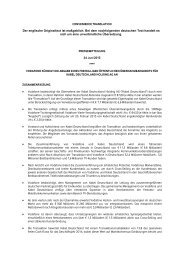Create successful ePaper yourself
Turn your PDF publications into a flip-book with our unique Google optimized e-Paper software.
2<br />
On-net Pricing in Mobile Moving the debate forward • The Policy Paper Series • Number 8 • April 2008<br />
presumption that any such on-net discounting will inevitably<br />
distort competition... Each case would need examination on<br />
its merits’ (p.114).<br />
<strong>Vodafone</strong> has been thinking about on-net pricing issues<br />
since 2001 and has been involved in most of the enquiries<br />
to be undertaken by regulators or anti-trust authorities in<br />
Europe during this period. 1 Some of the papers contained in<br />
this pamphlet date back to 2004 or earlier, but none have<br />
been published before.<br />
The papers have been intended to help us address the<br />
questions we have encountered on this subject. Jordi Gual’s<br />
paper provides an overview of the economics of on-net<br />
pricing, particularly as it relates to the use of on-net pricing<br />
in a converging environment. This paper was written to<br />
address complaints from fixed operators in Spain that<br />
mobile operators were using on-net pricing to ‘unfairly’<br />
compete with them. Gual shows that on-net pricing is an<br />
efficient and welfare enhancing strategy in this case.<br />
Dan Elliott’s paper addresses competition between<br />
mobile networks rather than between mobile and fixed<br />
operators. He addresses a question about what economic<br />
theory tells us about the conditions under which on-net<br />
discounts are welfare enhancing and those under which<br />
they are anti-competitive. In other words, how might<br />
regulators decide when to intervene and when to leave<br />
the market to work? Dan Elliott presents the modelling<br />
which is needed to solve these questions and shows that<br />
‘tipping’ is only a rational strategy under very extreme<br />
conditions which rarely occur in real world markets.<br />
Teligen were asked to use their tariff databases to examine<br />
what had happened in practice in some major European<br />
markets. They find that on-net prices have been a long<br />
standing feature of most markets, and that in the early<br />
phase of duopolistic competition they were used by both<br />
operators in the race to bring new customers into the market.<br />
Interestingly, this race did not have the ‘winner takes all’<br />
characteristics of ‘tippy’ markets, and market shares remained<br />
reasonably symmetric throughout the period. No operator<br />
was able to use on-net discounts to force its rival out of the<br />
market, but neither did on-net discounts disappear once this<br />
became clear.<br />
Another round of licensing then brought new entrants into the<br />
European markets from the mid-1990s onwards. These new<br />
entrants used on-net discounts, normally at deeper discounts<br />
than the existing operators. Competition between the new<br />
and existing operators took the pattern of leader-follower<br />
in all markets – with the larger networks reacting to on-net<br />
pricing moves by the smaller networks.<br />
Teligen’s findings support Elliott and Gual’s view that on-net<br />
discounts are more likely to be driven by competitive<br />
pressures than the result of anti-competitive intent (or<br />
effect). Jonathan Sandbach finds no correlation between<br />
on-net discount and market concentration or network size.<br />
If anybody thought on-net discounts would limit competition<br />
in European mobile markets then the evidence presented<br />
here suggests they were wrong.<br />
Notes<br />
1 see http://www.ofcom.org.uk/bulletins/comp_bull_index/comp_bull_ccases/<br />
closed_all/cw_615/?a=87101 and Spanish Competition Court ruling with respect<br />
to casefile 572/03 of 22 December 2004.

















